#Research and Development center in Ukraine
Text
World: A Growing BRICS Bloc Shows U.S. Is Losing the Battle for the Global South
— BY Tom O'Connor | August 22, 2023
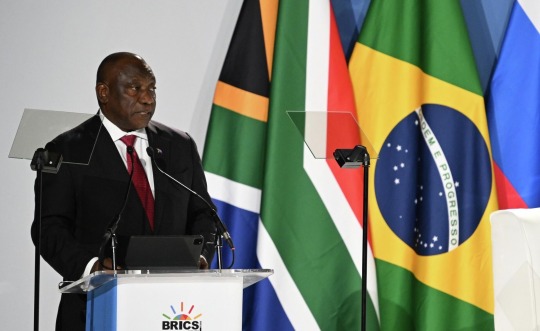
South African President Cyril Ramaphosa Delivers a Speech at the 15th BRICS Summit in Johannesburg, South Africa. © Sputnik/Grigory Sysoev/Go to the Mediabank
While Russian President Vladimir Putin's in-person absence due to international legal troubles looms over the BRICS conference attended by the leaders of fellow member states Brazil, India, China and South Africa, the growing interest in expanding the group to include additional countries from across the globe is likely to cement the bloc's future as a force in global geopolitics.
And with no seat at the table for the United States, the three-day summit that began Tuesday in Johannesburg demonstrates how Washington has struggled to project influence throughout the vast, developing Global South.
"The U.S. is trailing countries such as Russia, India and China in the Global South," Akhil Ramesh, a senior fellow at the Hawaii-based Pacific Forum, told Newsweek. "The Global South does not have this special solidarity it has with nations such as China and India. As victims of Western imperialism/colonialism and having faced similar challenges in reconstruction and development, they have a unique solidarity."
"The U.S. approach continues to be one where they use nations of the Global South as pawns in their future, larger cold/hot conflict with China or Russia," Ramesh added. "This understandably has not helped them win friends."
Such solidarity continues to extend to Putin, who has accelerated his country's outreach to developing nations, especially in Africa, in recent years.
Moscow's overtures have been met with ongoing interest, as evidenced by the recent Russia-Africa Summit in Saint Petersburg. The summit was attended by 16 African heads of state and representatives of 25 additional African countries, even as the West has accused Putin of war crimes, resulting in an International Criminal Court warrant, and of weaponizing food by bombing grain infrastructure and allowing a deal that safeguarded the continued export of Ukrainian grains via the Black Sea to collapse.
U.S. warnings about forging closer economic ties with China have been met with even stiffer resistance, as President Xi Jinping presses on with his ambitious Belt and Road Initiative extending across continents despite a slowing economy at home.
Ramesh argued that nations of the Global South simply "do not view Beijing and Moscow the same way the West does," and instead see new opportunities where traditional mechanisms have failed.
"So, when there was a group presenting an alternative to the Western-led world order/vision of the world," he added, "nations were quick to jump on the bandwagon."
Newsweek has reached out to the U.S. State Department for comment.
Still, obstacles to progress exist within a bloc whose core members already have little alignment in their broader geopolitical goals, while some, especially China and India, have active disputes between them. Such feuds have the potential to only grow as the coalition considers taking on new members, such as Iran and Saudi Arabia.
Others who have applied include Algeria 🇩🇿, Argentina 🇦🇷, Bahrain 🇧🇭, Bangladesh 🇧🇩, Belarus 🇧🇾, Bolivia 🇧🇴, Cuba 🇨🇺, Egypt 🇪🇬, Ethiopia 🇪🇹, Honduras 🇭🇳, Indonesia 🇮🇩, Kazakhstan 🇰🇿, Kuwait 🇰🇼, Morocco 🇲🇦, Nigeria 🇳🇬, the Palestinian National Authority 🇵🇸, Senegal 🇸🇳, Thailand 🇹🇭, the United Arab Emirates 🇦🇪, Venezuela 🇻🇪 and Vietnam 🇻🇳, according to the most recent count offered last week by South African Foreign Minister Naledi Pandor.
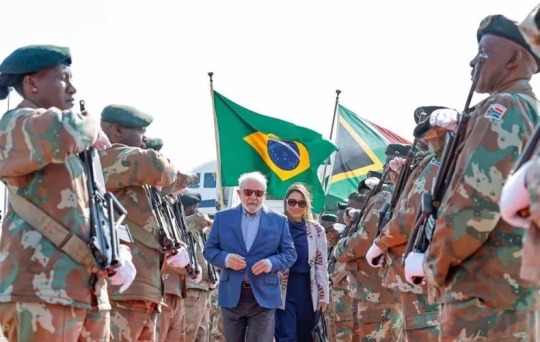
Brazil, Lula, arrives, BRICS, summit, South, Africa! Brazilian President Luiz Inácio Lula da Silva arrives in Johannesburg, South Africa ahead of the 15th BRICS summit. The leaders of 67 countries have been invited to join the forum led by Brazil, Russia, India, China and South Africa. Ricardo Stuckert/Presidency of The Federative Republic of Brazil
"Those who are there for the day-to-day negotiations, at least from the Brazilian government side, say it is already very hard to come to consensus when you have China, India and Russia at the table," Ana Elisa Saggioro Garcia, a professor at the Pontifical Catholic University of Rio de Janeiro's Institute of International Relations and general coordinator of the BRICS Policy Center, told Newsweek.
But "there's another side of the story," she said. That's the growing view, including from Brazilian President Luiz Inácio Lula da Silva, that "a strong BRICS" is necessary, and a "strong BRICS is also a big BRICS."
South Africa, the current chair, is the only nation to have been added to what began as an informal BRIC bloc, born out of a term coined by then-Goldman Sachs chief economist Jim O'Neill in 2001 to describe emerging economic powers. Russia led the initiative to bring Brazil, China and India together for the first summit in 2009, and South Africa was admitted the following year.
Initially, BRICS was focused on effecting reform within existing, primarily Western-led economic institutions, such as the International Monetary Fund (IMF), in the wake of the 2008 global financial crisis.
"The first common agenda that they had, despite their differences, was the reform of the international financial architecture," Garcia said. "So, international financial institutions, those grounded in the Bretton Woods Conference, in the post-war period, they do not represent the world anymore. Those huge economies don't have enough voice in those institutions, they need to be reformed. They need to reflect the new configuration of the world economic power."
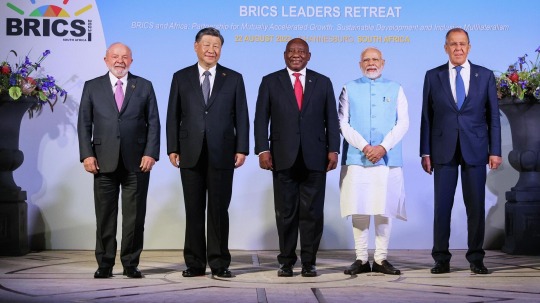
© Russian Ministry of Foreign Affairs/Go to the Mediabank
Gradually, the group became more focused on creating alternative mechanisms, most notably in the establishment in 2014 of the Shanghai-based New Development Bank, which today also counts Bangladesh, Egypt and the United Arab Emirates as members. With this transformation, Garcia explained, "the geopolitical character of BRICS started to be more important and more relevant than only the economic one."
China, in particular, she argued, "has been very clever and very strategic to use this opportunity to advance and to expand another coalition where China is predominant, where China doesn't have to deal with negotiations with Western powers."
But as evidenced by Brazil's enthusiasm for a more active role for BRICS and the growing list of prospective members, it's not all about Beijing.
"BRICS has become this pole of attraction of all countries now who've seen that they can have more power if they ally with a coalition such as BRICS to face measures that the West has been doing for years now," Garcia said, "and also to face these sorts of constraints and repression in terms of worldview and values."
Ryan Berg, director of the Center for Strategic and International Studies' (CSIS) Americas Program in Washington, D.C., also discussed how countries like Brazil were becoming more interested in the geopolitical nature of BRICS as an exercise in "active nonalignment."
"It can heighten the relevance of a country like Brazil, which is sometimes overlooked and feels overlooked and neglected," Berg said in response to Newsweek's question during a CSIS call held in the leadup to the BRICS summit.
"By pursuing this strategy," he explained, "you can basically make it a competition for the affection or for the attention of major world powers or leading world powers that would otherwise overlook Brazil's position on a particular issue."
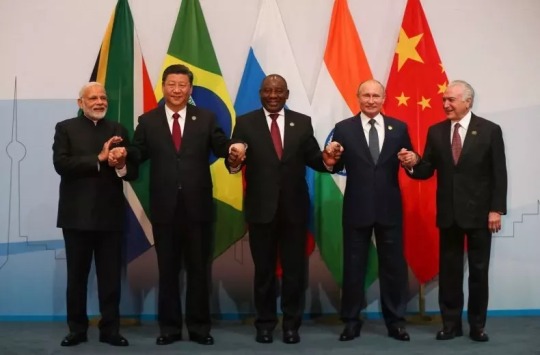
BRICS, Summit, South, Africa, 2018! (Left to right) Indian Prime Minister Narendra Modi, Chinese President Xi Jinping, South African President Cyril Ramaphosa, Russian President Vladimir Putin and then-Brazilian President Michel Temer pose for a group picture during the 10th BRICS summit on July 26, 2018 at the Sandton Convention Centre in Johannesburg, South Africa. South Africa's most populous city against hosts the BRICS summit in 2023, after each of the other four members hosted gatherings, three of which were virtual due to the COVID-19 pandemic. Mike Hutchings/POOL/AFP/Getty Images
Speaking on the same call, CSIS Africa Program director Mvemba Phezo Dizolele highlighted the importance of the host nation itself, saying BRICS membership "strengthened the position of South Africa among non-aligned countries" at a polarizing time in global geopolitics.
"Non-aligned countries have absolutely been at odds at least with Western countries, particularly ideologically because they do not want to align either with the Russians or with the United States and allies," Dizolele said.
A key goal for the summit's participants "will be discussing their disillusionment with U.S. leadership or at least the U.S.-led coalition around the world and how that world order is affecting adversely the countries of the Global South," he said, noting that "this will be a time when they will be seeking an alternative to that power."
The phenomenon of a competition among major powers to court the Global South was also observed by Mrityunjay Tripathi, a research fellow at the New Delhi-based Public Policy Research Center who previously served as part of India's delegation to the 2018 BRICS Youth Summit in South Africa.
"U.S. attempts to engage the Global South will only benefit the region, as the U.S. will act as a balancing power in the region dominated by China," Tripathi told Newsweek. "This competition will only benefit the developing economies and the multipolarity of the BRICS will ensure that region remains free and open to all."
Here, he said that "the presence of India adds credibility to BRICS and assures the West that India will act as a balancing power in the alliance that consists of Russia and China."
While New Delhi and Washington have strengthened ties in recent years, this does not mean total alignment in their positions. Tripathi argued that the trends apparent in the summit and context surrounding it show that Washington was on the backfoot in this competition over developing nations.

BRICS, Business, Forum, meets, in, South, Africa! (From left to right) Shaogang Zhang, vice chair of China's Council for the Promotion of International Trade, Onkar Singh Kanwar, chair of the BRICS Business Council's India chapter, Sergei Katyrin, chair of the BRICS Business Council's Russia chapter, José Serrador, chair of the BRICS Business Council's Brazil chapter, Busi Mabuza, chair of the BRICS Business Council's South Africa chapter, and Nozipho Tshabalala, CEO of the Conversation Strategist, attend a panel discussion during the 2023 BRICS Business Forum in Sandton, north of Johannesburg, South Africa, on August 22. Gianluigi Guercia/AFP/Getty Images
"The growing interest in BRICS does suggest that the U.S.' attempts to assert influence, particularly across the Global South, have not always produced desired results," Tripathi said. "The rise of BRICS is indicative of a shift in power dynamics from the traditionally Western-dominated world order to a more multipolar global scenario."
A key part of this shift identified by Tripathi was not only expansion, but the vision of "instituting a common currency," something that "further solidifies the group's commitment to long-term sustainable progress of the Global South."
"A common currency will not only boost intra-BRICS trade," he added," but also eliminate the high dollar conversion costs of international transactions."
Shen Shiwei, a journalist and analyst with a background in Chinese business dealings in Africa and the Middle East, argued that "the only thing that can beat the U.S. dollar is the dollar itself, driven by weaponization from Washington."
"The global trend of increasing the use of multiple currencies, instead of fully relying on U.S. dollars, is not a new idea," Shen told Newsweek. "Three decades ago, the euro was created in part because the majority of the EU wanted to move away from its deep reliance on the U.S. dollar."
"The dollar is still essential to global investments and trade," he added, "but the process of de-dollarization is accelerating, mainly because its weaponization has caused an erosion of confidence and alerted emerging economies to take actions to safeguard economic security."

People walk past a banner outside the venue for the 2023 BRICS Summit at the Sandton Convention Centre in Sandton, Johannesburg, on August 20. The BRICS countries, an acronym of the five members Brazil, Russia, India, China and South Africa, meet for three days for a summit in Johannesburg from August 22-24. Gianluigi Guercia/AFP/Getty Images
The U.S. dollar continues to command a significant lead against competitors, comprising some 59 percent of the world's foreign exchange reserves. The euro constitutes around 20 percent, with other currencies such as the Japanese yen, the United Kingdom's pound sterling and the Chinese renminbi in the single digits.
Still, a number of countries, particularly members of BRICS, have called for conducting bilateral trade in their own national currencies, and the idea of a common currency has been increasingly put forth. In April, Lula delivered an impassioned speech at the New Development Bank headquarters in which he railed against the notion that "all countries are forced to do their trade backed by the dollar."
The message has continued to gain traction among existing and prospective BRICS members.
"But that doesn't mean BRICS is anti-West," Shen said.
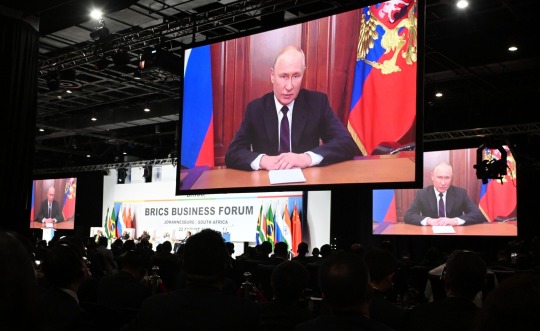
Russian President Vladimir Putin addresses BRICS summit in South Africa, August 22, 2023. © Sputnik/Grigory Sysoev
He argued that "the zero-sum game narrative developed in the West that the BRICS was created as competition to the G7 or the Global North is very misleading."
The G7, officially the Group of Seven, is a bloc consisting of the world's largest developed economies, including Canada, France, Germany, Italy, Japan, the United States and the U.K., with participation from the European Union as well. The G7 existed as the G8 until 2014, when it was expelled due to its role in the first major outbreak of conflict in Ukraine.
"All BRICS members have important political and economic cooperation with the G7 countries," Shen said. "More importantly, BRICS doesn't want to copy the Western hegemony in mentality and reality, which has brought too many problems to the Global South."
As opposed to the G7, "the BRICS mechanism has met the demands of the Global South, especially marginalized countries, to advance a collective agenda and push the building of a more inclusive, representative, just and fair global architecture," Shen argued.
"BRICS is not an exclusive club or small circle," he added, "but a big family of good partners."
#World 🌎#BRICS#Global South#United States 🇺🇸#Vladimir Putin#Russia 🇷🇺 | Brazil 🇧🇷 | India 🇮🇳 | China 🇨🇳 | South Africa 🇿🇦#Western Imperialism/Colonialism#Russia-Africa Summit | Saint Petersburg | Russia 🇷🇺#Beijing | Moscow#President Xi Jinping#Akhil Ramesh | Hawaii-based Pacific Forum#Ana Elisa Saggioro Garcia | Professor | Pontifical Catholic University of Rio de Janeiro#Shanghai | New Development Bank#Ryan Berg | Center For Strategic and International Studies' (CSIS) | Americas Program in Washington D.C.#CSIS Africa Program | Mvemba Phezo Dizolele#Disillusionment with U.S. | Leadership | U.S.-led World’s Coalition#Mrityunjay Tripathi | New Delhi | Public Policy Research Center#European Union 🇪🇺#G7 | G8#UK 🇬🇧 | Ukraine 🇺🇦#Japanese Yen#US 🇺🇸 Dollar | United Kingdom 🇬🇧 Pound Sterling#Shen Shiwei | China | Africa | Middle East
0 notes
Text
The Best News of Last Week - November 28, 2023
🐑 - Why did Fiona the sheep become a mountaineer? She was tired of the "baa-d" jokes at sea level!
1. Pope Francis dines with transgender women for Vatican luncheon
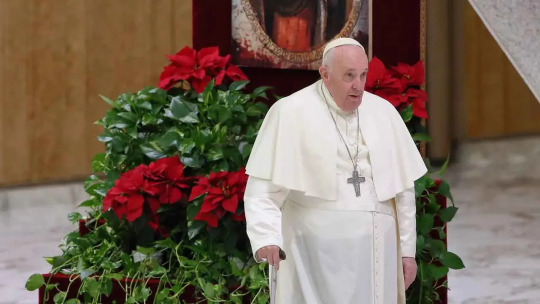
Pope Francis hosted a group of transgender women — many of whom are sex workers or migrants from Latin America — to a Vatican luncheon for the Catholic Church's "World Day of the Poor" last week.
The pontiff and the transgender women have formed a close relationship since the pope came to their aid during the COVID-19 pandemic, when they were unable to work. Now, they meet monthly for VIP visits with the pope and receive medicine, money and shampoo any day, according to The Associated Press.
2. New York just installed its first offshore wind turbine

The first wind turbine installation at South Fork Wind, New York State’s first offshore wind farm, is complete.
The 130-megawatt (MW) South Fork Wind will be the US’s first completed utility-scale wind farm in federal waters.
3. Anonymous businessman donates $800k to struggling food bank

But this Thanksgiving, a longtime prayer of food bank leaders was finally answered: an anonymous benefactor donated the full $800,000 they needed to move out of a facility they've long outgrown. That benefactor, however, preferred to stay anonymous.
"Very private company, really don't want attention," said Debbie Christian, executive director of the Auburn Food Bank. "It's a goodhearted person that just wants to see the work here continue, wants to see it expand."
4. Empowering woman saving hopes and mental health of suffering Ukrainian kids

Kenza Hadij-Brahim is at the forefront of promoting Circle of Toys
Hadj-Brahim is helping to launch the Circle of Toys initiative. A project that provides Ukrainian children in need of some normality with preloved toys. This new initiative connects people with old toys they might otherwise throw away, with Ukrainian families in need who want to provide some comfort to their children in this distressing time.
Find Refuge said : “The endeavour is driven by a sincere purpose: spark joy, foster play, and bring a hint of normalcy back to the young lives in Ukraine.”
5. TWO LOST CITIES HIDDEN FOR CENTURIES WERE JUST DISCOVERED IN BOLIVIA

Researchers have found these areas not only housed structures and pyramids but it has been uncovered that there were advanced irrigation systems, earthworks, large towns, causeways, and canals that cover miles.
Dr. Heiko Prümers from the German Archaeological Institute, who was also involved in the study comments that “this indicated a relatively dense settlement in pre-Hispanic times. Our goal was to conduct basic research and trace the settlements and life there. The research sheds light on the sheer magnitude and magnificence of the civic-ceremonial centers found buried in the forest”.
6. Sheep dubbed Fiona rescued from cliff in Scotland where she was stuck for more than 2 years
youtube
And at last, some positive climate news:
7. Three positive climate developments

Heating
When the Paris Agreement was adopted, the global reliance on fossil fuels placed the world on a path towards a 3.5C rise in temperature by 2100. Eight years on, country commitments to reduce their carbon footprints have pulled that down slightly, putting the world on a path for a 2.5C to 2.9C by the end of the century.
Peak emissions
Annual greenhouse gas emissions responsible for climate change have risen roughly nine percent since COP21, according to UN data. But the rate of the increase has slowed significantly. Recent estimates by the Climate Analytics institute find global emissions could peak by 2024
Rising renewables
Three technologies—solar, wind and electric vehicles—are largely behind the improved global warming estimates since 2015.
---
That's it for this week :)
This newsletter will always be free. If you liked this post you can support me with a small kofi donation here:
Buy me a coffee ❤️
Also don’t forget to reblog this post with your friends.
814 notes
·
View notes
Text
Can a video game teach you to resist disinformation?
The U.S. government certainly thinks so: In May, the State Department’s Global Engagement Center (GEC), the government agency tasked with countering foreign disinformation, released a request for proposal offering $1 million for “an evergreen game in a sandbox platform, with an existing fan base, in which participants play a game that builds cognitive resilience to authoritarianism and promotes democratic norms and values.” The call for a sandbox platform refers to open, multiplayer game spaces such as Minecraft, Roblox, or Fortnite, which allow players to build forts, explore virtual worlds, experience short stories, and share experiences. This request is asking for proposals to use creative mode in Fortnite (or a similar platform) to design a custom game experience—only instead of being fun, it is meant to train people to resist Russian disinformation.
It’s an intriguing way to combat an existential challenge for democracy. Can play undermine lies more effectively than speech does? There is a lot about this idea that is compelling, but there are just as many reasons to be skeptical.
The GEC’s idea certainly has some validity. It wants to leverage the emerging field of prebunking—the art of making people aware of disinformation before they encounter it—to help build media literacy skills and contribute to online safety. This is a process that researchers call “inoculation,” which treats disinformation like a virus: You need to train your psychological immune system, so to speak, to learn how to identify and reject bad information. Researchers have suggested different methods for this, ranging from a very literal metaphor of exposing people to “weakened” forms of common disinformation up to complex media literacy training intended to prepare people to identify disinformation on their own.
Using games as part of the battle over information isn’t new. The United Nations Office of Counter-Terrorism has an entire project devoted to understanding the role of video games in what the U.N. calls “countering violent extremism.” Late last year, the Swedish Psychological Defense Agency—which, like the GEC, is empowered to combat foreign disinformation—sponsored research into foreign political interference that uses video games. And the European Journalism Observatory has highlighted video games, specifically, as a vector for disinformation during Russia’s ongoing invasion of Ukraine.
So, the GEC is addressing a serious problem with global implications. And the sandbox anti-disinformation proposal is not the only video game program that the agency is funding. As Aftermath reports, it is also offering $250,000 for a program at the U.S. Embassy in Ukraine that will use the process of building an esports team and hosting an esports tournament to provide “counter disinformation/conflict resolution training to confront foreign propaganda and disinformation in competitive online gaming spaces.” While these sums may seem high, a typical “indie” game (one that is not developed by a major studio) can cost a million dollars or more, and so-called AAA games (such as Grand Theft Auto, Fallout, or Call of Duty) can cost hundreds of millions of dollars to develop.
One challenge that inoculation programs face is establishing success conditions. After all, how do you know when someone is successfully protected against disinformation? There is no good answer for this yet—we can design experiments and surveys to measure how messages are being accepted or rejected by a population, but—like other preventative measures—success is negative. You know the program worked if you don’t see people repeating disinformation, rather than knowing it worked because some tangible finish line has been crossed. It is a problem requiring constant vigilance. In that sense, the GEC’s call for an evergreen (permanent) game to counter disinformation is aligned with broad aspects of disinformation research.
But is a game the best way to do this? For decades, games studies have adopted an argument put forth by Dutch cultural historian Johan Huizinga in the 1930s: Games and play are essential to civilization, because they (however unintentionally) teach children how to socialize and move within rules-based systems in a mirror of society.
Building on those ideas, media theorist Ian Bogost coined the term “procedural rhetoric” in the 2000s to argue that video games instruct players to view the world through a certain set of rules and to discard others—even when trying to “break” a game system, he argued, players are still learning how rules and games work. If one accepts this line of argument, then it would naturally follow that an effort to design a game to inoculate against disinformation has the potential to be highly effective.
There are some problems with this approach. The research into so-called serious games, which are games intended to do something other than entertain, suggests that they are the most effective when they are also fun to play. This is a bit of a contradiction, since a serious game is not made with entertainment as its primary purpose, and that is reflected in the GEC’s call. There is no mention of the evergreen game being fun for its players. The agency, understandably, is focused on the outcomes of the game, not the game itself. But making serious games fun is a hard challenge that researchers are still working on, and without it, the effectiveness of any serious game will be limited.
The fun challenge has plagued efforts to use video games to do achieve goals in foreign policy, statecraft, and human rights since the start of the 21st century. Games such as the International Committee of the Red Cross’s LifeRun (2020) or 11 Bit Studio’s This War of Mine (2011) try to cultivate in players a concern for civilians in warfare. The Lebanese militant group Hezbollah released Special Force (2003) so players can battle against Israeli soldiers in South Lebanon, and Fursan Al-Aqsa (2022), places players in the shoes of a Palestinian student who seeks revenge on the Israeli soldiers who tortured him in prison. Fursan is available on Steam, an online video game marketplace used by players around the world that (relevant for the GEC grants) also restricts sales in Russia and Belarus due to sanctions stemming from Russia’s 2022 invasion of Ukraine.
Militaries have used games for propaganda, too, from America’s Army (2002) to China’s Glorious Mission (2011). Some of these games went nowhere. (Hezbollah, for instance, did not make a fun game.) But others, such as America’s Army, endured for decades because they were fun—and that game became fun by abandoning some of its more serious pretensions as new editions were published.
While it is clear that the GEC is drawing on a large number of precedents, ideas, and projects, is there evidence that any of it works? After studying the Red Cross’s LifeRun game, which seems to be a close analog to the GEC’s call for proposals, scholar Jolene Fisher concluded that there are structural limits to what these games can be expected to do, given their small distribution and limited scale. In a recent report, the Carnegie Endowment for International Peace observed that initiatives to support local journalism and media literacy education were far more effective at undermining disinformation than statecraft or counter-messaging, but the former are also much more difficult to fund, implement, and scale.
Bogost, the media scholar, reflected in 2018 on his experience trying to make “persuasive games” and concluded the concept was more promise than delivery. “It was emotion and novelty that drove much of the interest in this work,” he wrote, not concrete or supportable projects. It could be that games are just an accessible channel to do this work compared to more effective methods.
There are broader issues with the GEC’s plans, too. I wrote my Ph.D. dissertation on the U.S. Army Esports (USAE) team, an effort launched in 2018 in an attempt to use esports to bolster years of flagging recruitment. The U.S. Defense Department certainly seems to be convinced that the team has been effective in growing its recruiting pipeline and boosting morale, however controversial it may be. But it also does not release data to support its claims of effectiveness, and in 2023, the Army announced a major overhaul of the recruiting process due to multiple consecutive years of missing enlistment goals. If the USAE is effective at growing recruitment, that growth was hard to see. (The service claims that it is on track to meet a much lower recruiting goal in 2024).
I wasn’t alone in observing the limited effects that games on influencing thinking. A couple of years ago, games scholar Philip Hammond observed that decades of U.S. military influence on video games has coincided with declining recruiting and less public trust. If games can persuade people, it’s hard to see how.
This does not mean that such programs are a failure, nor does it mean that the GEC’s program is futile. Rather, it indicates that, as Bogost cautioned, we should be clear about the gap between promise and delivery, and mindful of where that gap emerges.
The GEC’s success in persuading social media companies to moderate away Islamist extremist content on their platforms (the most effective way to counter disinformation, according to researchers) suggests that it sometimes can do this work effectively. After all, while the growing presence of extremists in video games is a real concern, it is the community and discourse around games where that extremism tends to emerge, not within the storylines and play of the games themselves.
Games scholar Sky LaRell Anderson calls these conversations “extraludic narratives,” and in studying them found that they form an important basis for building communities around sharing gameplay experiences. Such a dynamic leaves open the potential for the GEC’s sponsored esports team in Ukraine to influence some of those narratives about Russia, or even to cultivate a community of resistance against Russian narratives in Ukraine’s Esports spaces. But researchers find this dynamic hard for outsiders to understand in real time, much less to intentionally shape beforehand. Governments just aren’t cool, and the USAE’s own engagement scandals point to the many scenarios where government sponsorship might be a poison pill.
The GEC has experienced this with its other efforts to counter disinformation. Its successful campaign to contain Islamist disinformation online, when applied to countering Russian disinformation, resulted in the center being subjected to unfair, partisan attacks by far-right politicians in the United States. Republicans in the House of Representatives tried last year to block the center’s budgetary reauthorization, falsely claiming that it targeted conservatives for censorship. Embattled Rep. Darrell Issa disputed the need for a counter-disinformation agency and claimed that the GEC had no successes to justify its budget despite the agency’s successful work countering disinformation.
The dishonest nature of these attacks points to a difficult political environment emerging for the agency. It could be the case that sponsoring games and gaming events is all that the agency has left if platform governance has become closed off by toxic right-wing politics. The GEC is a meaningful organization that treats the threat of disinformation with the appropriate seriousness.
But if politics prevent the agency from responding effectively to disinformation in the venues where it can be the most effective, it is hard to blame it for trying something else. Still, we should be cautious and keep our expectations in check: As unfair as the right-wing attacks on the agency are, and as hard as it works to address disinformation globally, those same attacks will also be carried over to the teams and games the agency sponsors.
Even in an ideal environment, there would be modest expectations for such a small program, but those may be impossible to meet. Disinformation is ultimately a political challenge, not a technical one, and the politics of disinformation in the United States have already tied the GEC’s hands. It’s just not clear how this political problem can be solved with a video game.
10 notes
·
View notes
Note
Congrats on your new journal article! Can you talk a little about your research? What’s your area of focus, what research plans do you have coming up? I have an insatiable interest in other peoples’ research!
I am a medievalist by training, though my focus has also expanded into early modernism and modernism, and one of my main research interests is how medievalism or medievally-themed ideas (for better and often uh, very much worse) operate in modern politics, culture, and media. My latest journal article is examining the premodern history and the culture of crusading in the current Russia-Ukraine war; the one that came out earlier in the year was premodern queer history and the crusades. I generally work on premodern (broadly defined) gender/queerness, law and society, war, crusades, religion, and politics, based in but by no means confined to Western Europe, with ancillary interests in the Mediterranean and Eastern Europe. As noted, I also have a strong comparative-historiography interest in demonstrating how medieval history is used to inform modern society and why this is often very misleading.
My current research focuses on premodern queer history, which has been the theme and/or co-theme of most of my more recent stuff. I am developing a mini-book project based on my UK conference paper from this summer focused on reconsidering queer legal, textual, narrative, and physical space within the premodern/medieval context. The general disclaimer is often that this material is marginalized, individualized, ignored, irrelevant, or existing unremarked on the fringes of medieval society, far from the centers of power, which frankly I don't think is correct. If you look at the places in which the theme and substance of "queerness" (in the modern definition; this is not the same at all in the medieval world) exists, it in fact directly informs and creates some of the most central institutions (and anxieties) of European-medieval society, including the king, the church, the literature, and other areas of traditionally-defined "power." So while the study of queer silence, gaps, omissions, and other places where the heteronormative record has prevailed is useful in some amount of retrieving unsignified queer experience, this also gives rise to the notion that premodern queerness is only ever silent or subtextual, and places where it very explicitly appears or speaks have to be argued over or discredited or somehow created to say something other than what they say. So yes.
Because my current university role is primarily administrative rather than teaching-focused, I don't have nearly as much time for actual research as I would like. I am in the process of developing the written prospectus for the above project; it will go to the editorial board at a medieval and renaissance studies center and university press when I am done. We don't know when that will be, but we certainly hope something like a timely fashion (I also have another full-length research project/monograph on premodern queer history that will probably have to wait for a faculty post with dedicated research time, assuming I ever get one. We will see.)
44 notes
·
View notes
Text
The Russians completely destroyed the Tavrian Chersonesus in Sevastopol, a UNESCO World Heritage Site

This is reported by "UP. Life" with reference to Evelina Kravchenko, a senior researcher at the Institute of Archeology of the National Academy of Sciences of Ukraine.
The researcher told about this at the III International Forum of the expert network of the Crimean Platform . She emphasized that the Russians are destroying original architectural monuments and erecting new buildings in their place.
"Now negative processes are taking place with the only monument of world importance, which we managed to nominate and include in the list of monuments in Crimea - Chersonesus Tavriysky ," said Evelina Kravchenko.
It is noted that in 2015-2016, the developers fenced off the archaeological remains located on the surface: towers, walls and columns with viewing platforms. Later, an amphitheater was built on the site of the ancient citadel, and it carries a load of about a ton on the original structure.
In addition, a significant part of the found artifacts was taken to Russia: frescoes, dishes, household items and icons. After that, the construction of the archaeological park "New Chersonese" began on the site of the remains of the necropolis.
"The Russians did not know anything about the geological situation at this place, so they began to remove the soil on the territory with ordinary excavators. Somehow they dug up an ancient spring there, so everything flooded ," shared Evelina Kravchenko.
Now, in fact, a new city has been built on the site of the archaeological remains. The archaeological park covers old finds, and a number of excavated objects were gradually moved and rebuilt elsewhere.
What's more, the Russians built St. Volodymyr's Cathedral where the settlement used to be. It is consecrated by the Moscow Patriarchate and subordinate to it.
What is known about the Tavrian Chersonesus
The ancient city of Chersonesus Tavri (translated from ancient Greek - "the city of the Sun God Horus") is located on the territory of the Heraklion peninsula of Crimea. This is the largest monument of Byzantium in the world.
Chersonesus existed 900 years before the creation of the Eastern Roman Empire. It was built in the 6th century. to n. is.
This historic city was one of the local centers of the Hellenic civilization, which originated in the Northern Black Sea region and later spread to Asia Minor and the Mediterranean.
The first archaeological park in Ukraine was created on the basis of Chersonesus Tavriyskyi. It is an object of cultural heritage of Ukraine.
On June 23, 2013, at the 37th session of the UNESCO World Heritage Committee held in Cambodia, Chersonesus Tavri and its choir (agricultural district) were included in the UNESCO World Heritage List.
After the occupation of Crimea by Russia, it became impossible to preserve the integrity of Chersonesus Tavriyskyi. In 2015, the Russian army poured concrete over the site of an ancient manor on Cape Chersonese. Until now, the occupation authorities are constantly destroying the historical monument and looting it.
#russian agression#ukraine#ukraine war#war#stop war#war crimes#stop putin#stop russia#russian terrorism#genocide
7 notes
·
View notes
Text
Since the beginning of Russia’s special military operation in 2022, its Radiological, Chemical, and Biological Defense Troops have laid bare the extent to which the US Pentagon, Centers for Disease Control and Prevention (CDC), and American biotech firms have been funding potentially illegal biological research in Ukraine.
The US, aided by Ukraine, continues to act in violation of international treaties banning chemical and biological weapons, evidence presented by the Russian Defense Ministry shows.
Furthermore, Washington is boosting efforts to develop bioagents capable of selectively targeting specific ethnic groups, the MoD said at its briefing on August 27.
An updated analysis of the activities of the US and Ukraine has revealed:
Washington is drawing Moldova and Romania into the logistics chains involved in the process of acquiring biomaterials from citizens of Russia, Ukraine, and other post-Soviet states.
Over 2,000 biomaterial samples were transported from Ukraine to the US via Moldova between August 2022 and May 2024.
Export is carried out by the US-based international biosample procurement company BioPartners, Inc., and Q2 Solutions, a subsidiary of a Pentagon supplier.
3 notes
·
View notes
Text
H.M. Queen Silvia's opening speech @ ISPCAN Congress
Your excellencies, distinguished guests, ladies and gentlemen,
First, allow me to express my gratitude for the privilege of opening the ISPCAN Sweden 2024 congress here today. It is an honour for Sweden to host this meeting.
I want to thank the International Society for the Prevention of Child Abuse and Neglect (ISPCAN) and Barnafrid – the Swedish National Center for Knowledge on Violence against Children at Linköping University for organising this important congress.
I am deeply grateful for the hard work and dedication of all participants in protecting children around the world. Your tireless efforts are greatly appreciated.
The congress’ theme Working Together in Times of Crisis emphasises the tough realities and challenges that children face because of armed conflicts, climate change and other related difficulties. The congress also addresses issues of racism, colonialism, bias, and their differential impacts on indigenous communities within child protection and justice systems. It focuses on collaborative approaches to protecting children, especially during challenging times.
Additionally, you will cover a wide range of topics relevant to child protection professionals and researchers from around the world. According to the World Health Organization (WHO), one billion children experience violence every year. In Sweden, nearly 60 percent of school-aged children reported exposure to violence in the latest national survey conducted in 2022. In many cases, the violence is perpetrated by an adult, including parents. The prevalence of violence is even higher among children with disabilities, such as neuropsychiatric disorders. Alarmingly, the analysis from this study indicates that exposure to violence has remained high over the last years or even increased, particularly in cases of sexual violence.
These facts urge novel solutions that are evidence-based and can be implemented efficiently, regardless of the level of resources in any given country. Child protection professionals and front-line workers are more challenged than ever to support children and families with fewer resources. In this work, multidisciplinary and multi-agency models, such as children’s advocacy centers and Barnahus, offer promise and potential.
One of the important themes of this congress is quality improvement. It emphasises the critical need for data-driven evaluation and quality improvement, particularly in children's advocacy centres and Barnahus. It is not sufficient to establish multidisciplinary collaborations across disciplines and agencies in these settings. We must recognise that continuous data-driven evaluation and quality improvement are essential for sustaining the global effort to prevent child maltreatment.
Twenty-five years ago, I established World Childhood Foundation with the vision to ensure that all children have a safe and loving childhood, free from violence, exploitation and sexual abuse. Our mission is to inspire, promote, and develop solutions to end the sexual violence and exploitation of children.
So far, we have supported more than 1,000 projects worldwide – initiatives and ideas that have developed and grown. Often, the ideas come from passionate individuals who have a deep understanding of children’s vulnerabilities and needs.
The work focuses on putting child sexual abuse on the global agenda. For example, several projects in Brazil, Cambodia, South Africa and Thailand aim to prevent sexual violence and enhance public and professional commitment to protecting children.
In Europe, the World Childhood Foundation has, among other things, helped establish Barnahus in Germany, Moldova, and Ukraine. But how does it work? The Barnahus collaborative model has proven to provide reliable, child-friendly, trauma-informed, and legally secure methods of avoiding the trauma for children who have been sexually abused. We actively work to spread knowledge and expertise about Barnahus and to facilitate the opening of more centres. I was delighted to learn that the Barnahus pre-conference, with the generous support of the Jerring Foundation, was held yesterday for the first time in the history of the ISPCAN world conferences.
Since the outbreak of the full-scale invasion of Ukraine, the World Childhood Foundation has supported Ukrainian children sheltering in neighbouring countries. The work has included providing psychosocial and humanitarian support to vulnerable groups, such as minority communities and children in institutions.
This experience has taught us the importance of strong, long-term commitment and the value of working together. Children and adults with lived experience possess invaluable knowledge that we should pay attention to by involving them in the work of finding new, tangible solutions.
We have an incredible gathering of brainpower, accumulated knowledge, experience, and enthusiasm here today. Let us harness this collective strength to discover new solutions for preventing violence and supporting children who have been exposed to trauma and other adversities.
Thank you.
Speech held by H.M. Queen Silvia on Aug. 19, 2024.
2 notes
·
View notes
Text

Russian stealth hunting Su-57 is ready for export
Announcement was made by FSMTC employees at the Dubai Air Show.
Fernando Valduga By Fernando Valduga 11/14/2023 - 08:31am Dubai Air Show, Military
Russia is ready to receive export orders for its Su-57 poaching after completing its development program.
Officials of the Federal Service for Military-Technical Cooperation (FSMTC) declared at the ongoing Dubai Air Show that, "if our foreign partners contact us, we are ready to start working on this topic". They noted that several customers are already showing “growing interest” in Su-57 aircraft.
Since the end of 2022, the Russian Aerospace Forces have received three batches of Su-57, most of which are actively involved in the ongoing conflict in Ukraine. Notably, some of these aircraft have the latest 'Product 30' engine, also recognized as the 'second stage', improving the thrust and super crucing capabilities of the stealth jet.
The Su-57 launches missiles and bombs from its internal compartment - an exclusive feature shared only by a few selected aircraft around the world.

In the field of fifth-generation aircraft available for export, the Russian Su-57 is next to the F-35 as a singular competitor.
Rostec's recent announcement announces the start of the 5ª generation Su-57 serial multifunctional fighter equipment with 2º stage post-combustion turbojet engines, labeled as 'Product 30'. With a post-combustion thrust of 18,000 kgf and a maximum thrust of 11,000 kgf, this advance amplifies the thrust-to-weight ratio of vehicles by 1.2 times (increasing from 1.13 to 1.36 kgf/kg with normal takeoff weight with 63% fuel).
This improvement translates into an increased ascent rate, ranging from 330 to 340-350 m/s, along with an increase in angular velocity during constant curves. In addition, it raises the service ceiling and supersonic cruise flight speed to 2,150-2,200 km/h and the maximum speed to an impressive 2,600-2,700 km/h.
Notably, the engines at the center of this advance were created by the team of the JSC Salyut Gas Turbine Research and Production Center.
Tags: Military AviationDubai AirshowRussiaSukhoi Su-57 Felon
Sharing
tweet
Fernando Valduga
Fernando Valduga
Aviation photographer and pilot since 1992, has participated in several events and air operations, such as Cruzex, AirVenture, Dayton Airshow and FIDAE. He has work published in specialized aviation magazines in Brazil and abroad. Uses Canon equipment during his photographic work in the world of aviation.
Related news
MILITARY
Lockheed Martin partners with European companies at the F-16 training center in Romania
11/13/2023 - 7:35 PM
An NH 90 helicopter of the German Bundeswehr armed forces (top) and a Tiger attack helicopter are seen during an exercise at Holzdorf Air Base. (Photo: REUTERS/Fabrizio Bensch)
HELICOPTERS
HENSOLDT integrates NH90 and TIGER helicopters into modern data link network
13/11/2023 - 16:00
MILITARY
VIDEO: Bayraktar TB3 from Turkey completes its first flight with landed gear collected
11/13/2023 - 2:00 PM
The 737 MAX family offers greater efficiency to enable long-term sustainability goals.
COMMERCIAL
SunExpress will buy up to 90 Boeing 737 MAX jets to boost robust growth
13/11/2023 - 13:00
MILITARY
Bombardier delivers seventh aircraft for Saab's GlobalEye program
11/13/2023 - 11:00
Dubai-based carrier will add 787-9 to the fleet of 737 to open new routes and serve more destinations.
COMMERCIAL
flydubai orders 30 Boeing 787 Dreamliners, its first widebody aircraft
13/11/2023 - 10:00
9 notes
·
View notes
Text
This is a passage from General Kirillov’s briefing. Absolutely astonishing:


“We have previously presented materials confirming the involvement of Hunter Biden and his Rosemont Seneca Foundation, as well as other US Democratic Party-controlled entities, in funding the Pentagon's main contractors operating in Ukraine.
It has been shown how deeply the son of the current US president, Hunter Biden, is involved in funding the US DOD-controlled company Metabiota.
However, some participants in closed projects remain in the shadows, although they are key players in Ukraine's military-biological programme.
They include former DITRA director Kenneth Myers,
executive vice president of the CIA-controlled In-Q-Tel venture capital fund Tara O'Toole,
former head of the US Centers for Disease Control and Prevention Thomas Frieden,
former the National Institutes of Health director Francis Collins,
former Battelle Memorial Institute executive director Jeffrey Wadsworth,
chief scientist and president of international research, development and medicine at Pfizer and many others.
All of them, in one way or another, are beneficiaries of the Pentagon's biological projects and are linked to the US Democratic Party, whose leaders act as the masterminds of military- biological research and the creators of covert money-laundering schemes to benefit a narrow circle of US elites.
It is these people who should be asked why taxpayers' money is being spent on illegal military-biological research in Ukraine and other countries around the world.”
“Despite formal bans, the US budget is being spent on dual-use research. In this connection, the Republican Party has initiated an investigation into the director of the National Institute of Allergy and Infectious Diseases and President Biden's chief medical adviser Anthony Fauci. Public funding through an intermediary organisation was confirmed for experiments to enhance the pathogenicity of viruses, including coronaviruses, the incidence of which was not widespread until 2019.
The investigation found that Fauci openly lied and deliberately concealed US government involvement in the research programmes.
At the same time, his collusion with social media management to manipulate public opinion on the causes of COVID-19 was revealed.
Such revelations raise legitimate questions for the US about the causes of new human-caused pathogens and the patterns of pandemic spread.”
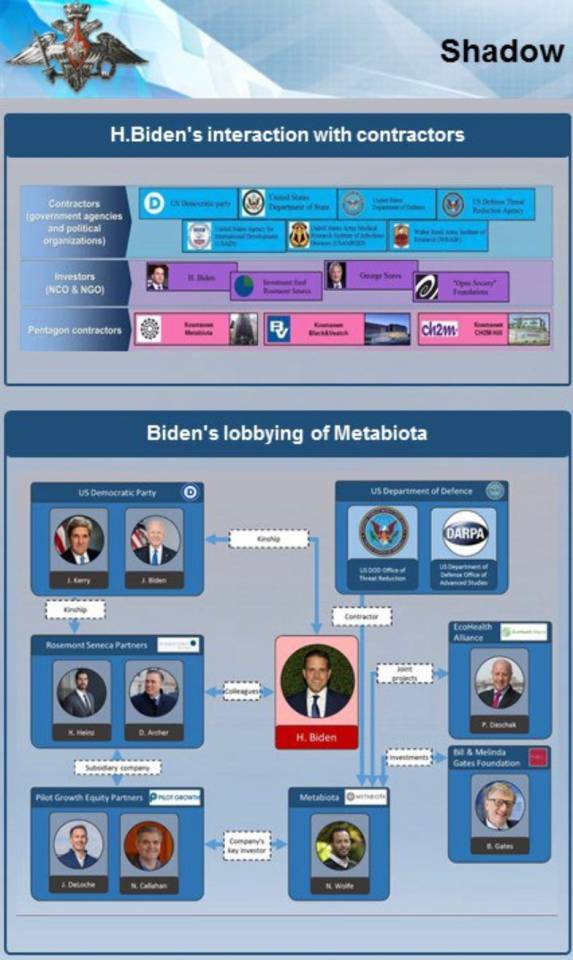

34 notes
·
View notes
Video
Paul Craig Roberts (PCR) has had careers in scholarship and academia, journalism, public service, and business. He is chairman of The Institute for Political Economy. President Reagan appointed Dr. Roberts Assistant Secretary of the Treasury for Economic Policy and he was confirmed in office by the U.S. Senate. From 1975 to 1978, Dr. Roberts served on the congressional staff where he drafted the Kemp-Roth bill and played a leading role in developing bipartisan support for a supply-side economic policy. After leaving the Treasury, he served as a consultant to the U.S. Department of Defense and the U.S. Department of Commerce. Dr. Roberts has held academic appointments at Virginia Tech, Tulane University, University of New Mexico, Stanford University where he was Senior Research Fellow in the Hoover Institution, George Mason University where he had a joint appointment as professor of economics and professor of business administration, and Georgetown University where he held the William E. Simon Chair in Political Economy in the Center for Strategic and International Studies. He has contributed chapters to numerous books and has published many articles in journals of scholarship, including the Journal of Political Economy, Oxford Economic Papers, Journal of Law and Economics, Studies in Banking and Finance, Journal of Monetary Economics, Public Choice, Classica et Mediaevalia, Ethics, Slavic Review, Soviet Studies, Cardoza Law Review, Rivista de Political Economica, and Zeitschrift fur Wirtschafspolitik. He has entries in the McGraw-Hill Encyclopedia of Economics and the New Palgrave Dictionary of Money and Finance.
Ukraine Has Lost - Is Putin Wrong? - Netanyahu's Policy | Paul Craig Rob...
2 notes
·
View notes
Text

2023 / 44
Aperçu of the Week:
"The USA is the main perpetrator of all massacres, from Hiroshima to Vietnam to Afghanistan. They must pay the price for their aggression."
(Hezbollah Secretary General Hassan Nasrallah, Lebanon, in a commentary on the Gaza war)
Bad News of the Week:
The Slovak Republic has a new old prime minister. New, because Robert Fico succeeds a center-right government led by the conservative OL'aNO (yes, that's how you spell it) that imploded after early elections. Old, because Fico, as leader of the left-wing nationalist party Smer ("Direction / Slovak Social Democracy"), which he founded, already held the office of Slovakian Prime Minister from 2006 to 2010 and again from 2012 to 2018.
During his first term in office, Slovakia joined the Schengen area and the Eurozone. So surely Fico is a convinced European? Unfortunately, he is not. Even worse for the head of state of a former Soviet satellite state: he is a staunch Russia fan from A to Z. Not to say a Putin groupie. And always has been. During the Caucasus War in 2008 (his first term in office), Fico condemned the "Georgian aggression" and took sides with Russia. During the annexation of Crimea in 2014 (his second term in office), he repeatedly criticized the EU sanctions imposed on Russia and even threatened to veto them.
And now? Even during the Ukraine war (his third term in office), his partisanship is absolutely clear. Even clearer than ever before. Samples from announcements made in recent days: Bratislava will not supply "one more shot of ammunition" to neighboring Ukraine. Ukraine is "one of the most corrupt countries in the world". The planned new EU aid package of no less than 50 billion euros is to be prevented. The money would fall into exactly the wrong hands. After all, the war had already begun in 2014 when "Ukrainian Nazis and fascists began murdering the Russian population in the Donbass". Ouch.
Hungary's Prime Minister Viktor Orban can be pleased to have found a spiritual twin in Fico. And the much-vaunted EU unity on foreign policy issues is no longer just crumbling, it is slowly collapsing. The planned twelfth round of Russia sanctions is under long-term threat. And not just by Fico's own left-wing populist Smer party. Because its ultra-nationalist coalition partner SNS is linked to the Kremlin party "United Russia" by a friendship treaty. Incidentally, it has this in common with the Austrian FPÖ (Freiheitliche Partei Österreichs / Freedom Party of Austria). Elections will be held next year in the country neighboring Hungary and Slovakia. And it looks as if the Freedom Party's Herbert Kickl could win. Well then, good night Europe.
Good News of the Week:
"Poison for Eternity" is the title of a current TV documentary by ARD, the first public broadcaster in Germany. Which is known for its seriousness. So I was surprised by this extreme statement. Poison for eternity. But unfortunately that really seems to be the case. It's about PFAS. That stands for "per- and poly-fluorinated alkyl substances". And I had never heard of it before. And I would almost have preferred it to stay that way.
There are more than 10,000 different chemicals that are PFAS. They come in solid, liquid and gaseous form. And we all come into contact with them every day: they are found in food packaging and dental floss, for example. In outdoor clothing and car tires. In semiconductor technology and battery production. In other words: everywhere. And the stuff is practically non-degradable by natural means, hence "eternity".
Unfortunately, various health risks that PFAS can cause if it enters the human organism have been known since the 1960s. For example, the reduction of the vaccination response. Or the development of a fetus during pregnancy. Or simply cancer. Extensive research over the last 20 years has shown that PFAS can be detected in the blood of practically every human being on this planet. And so far nothing has happened. Excuse me?
But now - better late than never - Germany and four other EU countries have submitted an application to the responsible chemicals authority to restrict the manufacture, use and marketing of this devilish stuff. The development of alternatives will still take years. And the PFAS already in circulation will remain. But at least no new ones will (hopefully) be added in the near future. Where can I sign?
Personal happy moment of the week:
We met up with a friend for breakfast at the weekend. In a really nice café that we hadn't been to before. My vital breakfast included homemade raspberry jam. On a stroke of genius, I didn't spread it on a wholemeal roll, but ordered a croissant instead. The combination was a dream. Fortunately, the jam was also sold to take away. And I can now enjoy this culinary discovery at home too. Simple pleasures are sometimes the best.
I couldn't care less...
...about the so-called "parliamentary immunity". This is the term used to describe the protection of a political mandate or office holder from prosecution on the basis of their mandate or office. This legal right, which was created in Germany in the middle of the 19th century, was originally intended to protect the legislature from attacks by the then still monarchical executive. That is long gone. However, a certain degree of protection against prosecution still exists.
This is probably what the elected Bavarian AfD politician Daniel Halemba, who was arrested on Monday just hours before the constituent session of the Bavarian state parliament - i.e. shortly before his immunity was due to begin - had hoped. The charge fits perfectly with the far-right tendencies of the AfD (Alternative für Deutschland / Alternative for Germany): "incitement of the people and use of symbols of anti-constitutional organizations". The young man is just 22 years old.
But in other countries, too, the immunity of public officials plays a role in many applying for political office. It is an open secret that Donald Jessica Trump hopes to be re-elected to be protected from the many criminal prosecutions against him. Just like Israel's Prime Minister Benjamin Bibi Netanyahu. Both are therefore also - and this is even worse - trying to discredit the neutrality of the judiciary by accusing it of having a partisan political agenda. Because of course you are innocent and merely the victim of a witch hunt.
As I write this...
...I feel very trendy. Because "Goofy" has been voted the German (!) youth word of the year. And - what a surprise - it stands for "in reference to the Walt Disney comic character (for) a clumsy, silly person or behavior". I knew that before today's teenagers were even born. I must be ahead of my time.
Post Scriptum
There are rising attacks on Jews - all over the world. In the Russian autonomous region of Dagestan, for example, a mob stormed the airport earlier this week when a plane from Tel Aviv landed there. In Dagestan, as in most of the North Caucasus regions, almost only ethnic Muslims live. It can therefore be assumed that the attack was based on a misinterpretation of the widespread nonsense "All Jews are against all Muslims". We could, we should know better.
Unfortunately, people in Germany don't know any better. Since the beginning of the Gaza war, anti-Semitic crimes have more than doubled. The classic: Star of David graffiti on supposedly Jewish doors. Under National Socialism, Jewish families' homes and businesses were marked in this way, making them the target of unpunished attacks by whoever. This is reprehensible, oblivious to history, questionable, disgusting. And dangerous. Because it can fuel latent anti-Semitism, which unfortunately exists in this country just as much as latent racism. This is how a silent prejudice can turn into open violence. The majority that likes to remain silent must clearly oppose this. There is no line to cross in Germany that could be redder.
#thoughts#aperçu#good news#bad news#news of the week#happy moments#politics#usa#hezbollah#gaza#slovakia#robert fico#european union#pfas#poison#eternity#breakfast#croissant#immunity#donald trump#benjamin netanyahu#trendy#goofy#anti semitism#jews#palestinians#teenagers#afd#bavaria#germany
2 notes
·
View notes
Text
Events 2.20 (after 1940)
1942 – World War II: Lieutenant Edward O'Hare becomes America's first World War II flying ace.
1943 – World War II: American movie studio executives agree to allow the Office of War Information to censor movies.
1943 – The Saturday Evening Post publishes the first of Norman Rockwell's Four Freedoms in support of United States President Franklin Roosevelt's 1941 State of the Union address theme of Four Freedoms.
1944 – World War II: The "Big Week" began with American bomber raids on German aircraft manufacturing centers.
1944 – World War II: The United States takes Eniwetok Atoll.
1952 – Emmett Ashford becomes the first African-American umpire in organized baseball by being authorized to be a substitute umpire in the Southwestern International League.
1956 – The United States Merchant Marine Academy becomes a permanent Service Academy.
1959 – The Avro Arrow program to design and manufacture supersonic jet fighters in Canada is cancelled by the Diefenbaker government amid much political debate.
1962 – Mercury program: While aboard Friendship 7, John Glenn becomes the first American to orbit the Earth, making three orbits in four hours, 55 minutes.
1965 – Ranger 8 crashes into the Moon after a successful mission of photographing possible landing sites for the Apollo program astronauts.
1968 – The China Academy of Space Technology, China's main arm for the research, development, and creation of space satellites, is established in Beijing.
1971 – The United States Emergency Broadcast System is accidentally activated in an erroneous national alert.
1979 – An earthquake cracks open the Sinila volcanic crater on the Dieng Plateau, releasing poisonous H2S gas and killing 149 villagers in the Indonesian province of Central Java.
1986 – The Soviet Union launches its Mir spacecraft. Remaining in orbit for 15 years, it is occupied for ten of those years.
1988 – The Nagorno-Karabakh Autonomous Oblast votes to secede from Azerbaijan and join Armenia, triggering the First Nagorno-Karabakh War.
1991 – In the Albanian capital Tirana, a gigantic statue of Albania's long-time leader, Enver Hoxha, is brought down by mobs of angry protesters.
1998 – American figure skater Tara Lipinski, at the age of 15, becomes the youngest Olympic figure skating gold-medalist at the 1998 Winter Olympics in Nagano, Japan.
2003 – During a Great White concert in West Warwick, Rhode Island, a pyrotechnics display sets the Station nightclub ablaze, killing 100 and injuring over 200 others.
2005 – Spain becomes the first country to vote in a referendum on ratification of the proposed Constitution of the European Union, passing it by a substantial margin, but on a low turnout.
2009 – Two Tamil Tigers aircraft packed with C4 explosives en route to the national airforce headquarters are shot down by the Sri Lankan military before reaching their target, in a kamikaze style attack.
2010 – In Madeira Island, Portugal, heavy rain causes floods and mudslides, resulting in at least 43 deaths, in the worst disaster in the history of the archipelago.
2014 – Dozens of Euromaidan anti-government protesters died in Ukraine's capital Kyiv, many reportedly killed by snipers.
2015 – Two trains collide in the Swiss town of Rafz resulting in as many as 49 people injured and Swiss Federal Railways cancelling some services.
2016 – Six people are killed and two injured in multiple shooting incidents in Kalamazoo County, Michigan.
1 note
·
View note
Text
X has banned the account of a prominent critic after he published data that he claims exposed the site’s embrace of the far-right after Elon Musk’s takeover last year.
Travis Brown, a software developer based in Berlin, alleges his account was first suspended on July 1 this year, several months after his data formed the basis of New York Times and CNN reports claiming that far-right influencers featured prominently among Twitter Blue subscribers, and how thousands of previously banned X accounts, including members of the far-right, were being reinstated on the site.
On Tuesday, Brown announced his decision to challenge his account’s suspension in court in Berlin. “This is a matter of principle,” he says. “I think it is important that platforms like Twitter are not allowed to shut down criticism arbitrarily.” X did not reply to repeated requests for comment.
X has been accused of attempting to silence its critics several times since Elon Musk acquired the platform in October 2022. In July, X sued the Center for Countering Digital Hate (CCDH) after the nonprofit published research suggesting that problematic content on the platform, such as hate and disinformation, was becoming more widespread. In December 2022, X suspended the account ElonJet, which tracked the movement of Musk’s private jet.
“Elon Musk likes to pretend he cares about free speech, but this case exposes that commitment as little more than window dressing,” claims Tiemo Wölken, a German politician who represents the Socialists and Democrats group in the European Parliament. “Someone who silences critics and researchers by kicking them off their platform isn’t a free speech advocate.”
Brown says he worked for X for one year, leaving in 2015 when his team was shut down. In 2022, he received a grant from the Open Knowledge Foundation, a nonprofit, to build software that would enable him to trace the history of accounts engaging in disinformation and hate speech. That tool, which focused on the company then known as Twitter, enabled him to identify which social media accounts posting about Russia’s invasion of Ukraine had a history of posting spam. But it also meant he could identify, almost in real time, which previously banned accounts were being reinstated on X, he says.
“After Musk took over, you did see a very strong turn toward the far right, in terms of which accounts were being amplified, which accounts were building followings more quickly,” he claims.
Brown received no warning before his account was initially banned in July, the developer says. He says his account was restored in September, after a court order. But later that same month, Twitter informed Brown that his account would be banned again, with X justifying its decision to the court in a 36-page letter. X argued that Brown was using the platform’s data in a way that violated its terms of service. A similar argument was used in the case against the CCDH. X’s terms of service were updated in September 2023 to prohibit crawling or scraping in any form.
According to Brown, he has developed many small applications that draw on different data sources and are used by different researchers. But the tool he used to trace the history of X accounts relied on data from the Internet Archive, as well as data gathered from X’s API, he says, adding that this was done in a way he believed to be in compliance with the developer agreement at the time.
“What is at stake here is the freedom of researchers on social media platforms,” says Josephine Ballon, spokesperson for HateAid, a German nonprofit that campaigns against online hate speech and is helping Brown with his case. “Travis did not even publish this information on his own. He only contributed to press publications.”
The legal proceedings in Germany are ongoing. For Ballon, the best case scenario would be if the court reinstates Brown’s account again or rules the block to be unlawful. The worst outcome would be if the court declines to rule on the case because X’s European Union headquarters are based in Ireland. HateAid is asking the European Commission to intervene using the Digital Services Act, a new rulebook that went into effect in August and is designed to protect freedom of expression online.
“Even if we lose it, I think this case really shows how a huge social media company is going after a single person with really expensive lawyers and hundreds of pages of written documents,” says Ballon. “That really shows how aggressively they are behaving toward their critics.”
13 notes
·
View notes
Photo

This year continued to be A Lot and we decided to ensure that there were charities that directly addressed current events. Folded into this post are groups that work for aid targeting every natural disaster and man-made one, climate change, the ongoing COVID pandemic, and more. If you're looking for an organization that directly addresses any of those, this is your spotlight post.
For more information on donation methods and accepted currencies, please refer to our list of organizations page.
Center for Reproductive Rights
The Center for Reproductive Rights is the only global legal advocacy organization dedicated to ensuring reproductive rights are protected in law as fundamental human rights for the dignity, equality, health, and well-being of every person. With local partners across five continents, they have secured legal victories before national courts, UN Committees, and regional human rights bodies on issues such as access to life-saving obstetrics care, contraception, maternal health, and safe abortion services and the prevention of forced sterilization and child marriage.
Clean Air Task Force
As we've seen for a long time now but especially this year with constant natural disasters and alarming news from all over the world, climate change is real and we need to do something about it. Over the past 25 years, CATF, a group of climate and energy experts who think outside the box to solve the climate crisis, has pushed for technology innovations, legal advocacy, research, and policy changes. Their goal is to achieve a zero-emissions, high-energy planet at an affordable cost.
Coalition for Rainforest Nations
Boasting a voluntary membership of over 50 rainforest nations, CORN provides a single voice to countries that didn’t cause the climate emergency but nevertheless feel the brunt of it daily. CORN originated the global conservation mechanism Reducing Emissions from Deforestation and Degradation (REDD+) to stop deforestation. REDD+ was successfully mandated in the Paris Climate Agreement (2015) and covers 90% of the world’s tropical rainforests.
International Rescue Committee
Founded in 1933, the IRC is a long-standing trusted partner in supporting those whose lives have been upended by sudden violence, political or natural. Their main fundraising focuses right now are Pakistan and Ukraine, but they are no stranger to areas of disaster throughout the world as they currently work in 40 countries. The IRC provides emergency aid and long-term assistance, including refugee settlement, and focuses on health, education, economic well-being, empowerment, and safety.
Médecins Sans Frontières/Doctors Without Borders (MSF)
Odds are you’ve heard of MSF, the global organization that sends trained medical professionals to the places they’re needed most. MSF has been working globally for nearly 40 years, providing medical assistance to people affected by conflict, epidemics, disasters, or exclusion from healthcare—no matter what. They’re guided by principles of independence, impartiality, and neutrality to global political policies or movements.
National Asian Pacific American Women's Forum
NAPAWF is the only organization focused on building a movement for social, political, and economic change for Asian American and Pacific Islander (AAPI) women and girls. Their work focuses on policy and structural change, organizing and civic engagement, and legal advocacy and judicial strategy. They also tackle reproductive health and rights, economic justice, and immigration and racial justice.
National Network of Abortion Funds
The National Network of Abortion Funds builds power with members to remove financial and logistical barriers to abortion access by centering people who have abortions and organizing at the intersections of racial, economic, and reproductive justice. They provide their grassroots base of over 80 autonomous, diverse organizations/abortion funds with leadership development, infrastructure support, and technical assistance. Some fund procedures while others cover abortion pills, transportation, lodging, childcare, doula services, and other forms of support.
National Resource Defense Council
"We believe the world’s children should inherit a planet that will sustain them as it has sustained us. NRDC works to ensure the rights of all people to the air, the water and the wild, and to prevent special interests from undermining public interests." Since 1970, the NRDC has been a leader in legal advocacy for climate justice. They work with a staff of about 700 lawyers, scientists, and policy experts to reduce pollution and protect natural resources nationally and internationally.
Partners In Health
Founded by Paul Farmer when he was still in medical school, PIH is committed to bringing exceptional health care to every corner of the planet. PIH also works to provide access to food, transportation, housing, and other key components of healing to the most vulnerable. Their work started in Haiti but has expanded rapidly across the globe.
RIP Medical Debt
Over 100 million Americans (one in three) are struggling with paying off medical bills. COVID has only added to those numbers, putting people under significant financial burden and emotional distress. This organization buys up medical debt in order to forgive it with no tax consequences to donors or recipients. Donate just $1 and you wipe out $100 of someone's medical debt, $100 to get rid of $10,000 in debt, and so on—the ripple effect is real. Through their work, RIP Medical Help not only helps with financial relief but also brings attention to the need for a more compassionate, transparent, equitable, and affordable healthcare system.
The Solutions Project
Using grants and donations, The Solutions Project empowers grassroots leaders to build solutions, funding, and influence for the communities most affected by the climate crisis. They also provide media training and networking and leverage influencer and media relationships for their grantees. Due to the lack of representation of communities directly impacted by climate change, they aim to invest 95% of their resources to front line leaders of color and at least 80% to organizations led by women and gender nonconforming people. If The Solutions Project sounds familiar to you, it might be because Mark Ruffalo is one of the founders and he and Don Cheadle are among the board of directors!
World Central Kitchen
Started by Chef José Andrés, WCK makes sure that people are fed in the wake of natural disasters. Their programs advance human and environmental health, offer access to professional culinary training, create jobs, and improve food security. WCK also teaches food safety and cooking classes to native people who live where disasters have occurred, so they may open restaurants and support the local economy more permanently. Their current focuses are partnering with restaurants, one of the hardest-hit industries, through the pandemic (here and here) and assisting those affected by Hurricane Ian, Hurricane Fiona, floods in Pakistan, and the war in Ukraine.
17 notes
·
View notes
Text
[ad_1]
STEM IS FEM is an academic venture aimed toward popularizing STEM (Science, Know-how, Engineering, and Arithmetic) specialties amongst women and younger girls in Ukraine. The venture centered on totally different themes, together with post-reconstruction of devastated Ukrainian cities. Serhii Tokarev, the IT entrepreneur and initiator of STEM is FEM, talked concerning the contribution of the venture.
The Ukrainian instructional venture STEM IS FEM acquired 4,000 purposes to take part in its actions in 2023. Essentially the most important ones are talked about beneath. The venture applied a number of launches like a course “Urbanism,” a podcast “Science: Ladies’s Voices” and a two-day module “Gentle Business.” Serhii Tokarev shared extra data on every venture beneath.
“Urbanism”—the four-month instructional course
The primary objective of the venture was to contain Ukrainian youth in city planning and post-war reconstruction. The venture staff believes the collaborative work of residents of various genders, ages, and experiences is a strong strategy to restoring the devastated Ukrainian cities.
“The staff is actively working to make sure that as many voters as potential achieve data about city planning: understanding what our cities are like and what they will grow to be, what facets are price preserving, and what wants enchancment. With a major activity forward within the post-war reconstruction of the nation, it's essential already now to have interaction the youthful technology in restoring Ukrainian cities,” shares Tokarev.
In line with Serhii Tokarev, 50 women labored on the basics of city planning and structure and developed tasks to reconstruct public areas in three war-torn Ukrainian cities: Ichnia, Trostyanets, and Okhtyrka. In April 2023, the contributors introduced their works and the highest ten tasks have been refined by a staff of consultants and provided for additional implementation. Furthermore, three graduates have been granted internships at City Reform NGO.
Sequence “Urbanism”
After finishing the tutorial course, STEM is FEM has created an academic sequence “Urbanism” which was initiated by the Ministry of Digital Transformation of Ukraine. The sequence consists of 17 episodes reflecting totally different subjects and is out there on Diia.Training. Serhii Tokarev talked about subjects just like the examine of cities and accountable citizenship, post-war reconstruction, the shaping of public areas, inclusivity, and revolutionary development tasks.
“Gentle Business”—the two-day instructional module
One other theme the STEM and FEM venture centered on is an academic module “Gentle Business” carried out in collaboration with the ladies’s lingerie model brabrabra. About 30 contributors listened to motivational speeches and insights from trade consultants, studied the design and clothes manufacturing, and even created their lingerie collections.
“Science: Ladies’s Voices”—the podcast
STEM and FEM launched the podcast to focus on the contribution of girls in science. Every episode is about feminine researchers’ skilled and private journeys.
The IT entrepreneur is satisfied that it's critical to create a conducive tech setting for ladies. This permits for bettering technological progress by range of experiences and views.
The submit Serhii Tokarev: STEM is FEM’s Contribution appeared first on Vamonde.
[ad_2]
Supply hyperlink
0 notes
Text
Tuesday, September 24, 2024
World leaders gather at a U.N. desperate to save itself
(Washington Post) The backdrop to this week’s gathering of world leaders at the United Nations could hardly be more grim. Wars, increasing anxiety over the state of democracy and deep geopolitical divisions roil the global scene. The ongoing wars in Ukraine and over Gaza have only underscored the inefficacy of what is the world’s most significant decision-making body. Tough collective action to rein in Russia’s invasion of its neighbor has proved impossible with the Kremlin on the Council, while the United States has for months shielded Israel from international pressure. Officials in Turtle Bay looked on feebly over the weekend as Israel’s fight with Hezbollah in Lebanon threatened to sprawl into a full-blown war. Beyond the headline-grabbing conflicts, the international community embodied in the United Nations has failed to stop the disastrous civil war in Sudan, which seems likely to bring about one of the worst famines in recent years, or the steady disintegration of Myanmar’s state under its coup-plotting junta. (The international humanitarian advocacy group Oxfam has charted almost two dozen conflicts still raging, in part thanks to U.N. gridlock.) It has failed to adequately resolve spiraling post-pandemic debt crises plaguing countries in the developing world. It has presided over the displacement of a record number of people in communities torn apart by strife or collapsed by climate change.
The Fed sees its inflation fight as a success. Will the public eventually agree?
(AP) With its larger-than-usual half-point cut to its key interest rate last week, the Federal Reserve underscored its belief that it’s all but conquered inflation after three long years. The public at large? Not so much. Consumer surveys, including one released Friday by The Associated Press-NORC Center for Public Affairs Research, show that most Americans remain unhappy with the economy, still bruised by an inflation rate that hit a four-decade high two years ago as the economy rebounded from the pandemic recession. Sofia Baig, an economist at the polling firm Morning Consult, noted that Americans still see high prices as a financial burden. According to Morning Consult surveys, she said, when most people think about inflation, they think about how much lower prices were two or four years earlier. Fed officials and economists, by contrast, typically measure success in shorter-term durations—prices compared with a year ago, six months ago, even one month ago.
Possible Category 3 storm churns in the Caribbean
(Yahoo News) Meteorologists warn that a storm currently brewing in the western Caribbean Sea could potentially become the strongest hurricane landfall in the U.S. so far this season. Florida Gov. Ron DeSantis declared a state of emergency ahead of the weather system, which will be named Helene once it officially becomes a tropical storm. It is expected to make landfall near the Big Bend region of the Florida Panhandle as a possible Category 3 hurricane in the next few days. The storm is threatening millions of residents along the Gulf Coast with up to 12 inches of rainfall, high wind speeds between 111 mph and 129 mph, and tornadoes.
Venezuelan Gang’s Path to U.S. Stokes Fear, Crime and Border Politics
(NYT) At the country’s southern border, U.S. Border Patrol agents have been on the lookout for members of a notorious Venezuelan gang. In the nation’s heartland, police officers from Denver to Chicago have made dozens of arrests for alleged crimes linked to the group, from retail theft to murder and prostitution. And in New York City, police detectives have spent months interviewing informants—including confessed gang members—to identify gang leaders and gather information on robbery patterns and recruitment efforts. The gang in question is Tren de Aragua, which sprang from a Venezuelan prison and developed into a feared criminal organization focused on sex trafficking, human smuggling and the drug trade. Its widening presence in the United States has become a political lightning rod for Republicans, as they seek to blame the Biden administration’s border policy for allowing criminals into the country. Their accusations about the effects of migrant-fueled crime are often overstated or incorrect. Yet the gang has nonetheless emerged as a growing source of concern for law enforcement officials, who have been scrambling to study its inner workings and track its members’ movement across the country.
Elon Musk’s X backs down in Brazil
(NYT) Elon Musk appears to have given up his legal battle against Brazilian regulators after just a few weeks, with lawyers for X promising to comply with an order from Brazil’s Supreme Court. X’s lawyers say they’ve taken down multiple accounts accused of threatening the country’s democracy, paid fines for various offenses, and named a new legal representative—now, they hope that Brazil’s government will lift a nationwide block on their platform. As revenue from American advertisers has become unreliable for X, losing the estimated 20 million users from Brazil would strike a significant blow to the company’s bank accounts. During the time X was blocked, users flocked to alternatives like BlueSky and Threads (owned by Meta). Over the weekend, the Supreme Court confirmed X’s shift towards compliance but noted that the company still needs to file the proper paperwork before the ban is lifted.
The German Chancellor’s Party Ekes Out a Win Over the Far Right
(NYT) The embattled center-left party of Chancellor Olaf Scholz of Germany scored a hard-fought and narrow victory over the far-right ethnonationalist party, Alternative für Deutschland, or AfD, in an election in an eastern state of the country, potentially energizing Mr. Scholz’s government in Berlin. Although they do not affect the government in Berlin directly, state elections in Germany are often seen as a reflection of the national mood and a snapshot of the government’s popularity. Mr. Scholz’s party, the Social Democrats, won 31 percent of the vote, and the AfD got just above 29 percent, according to official preliminary results. Nearly 45 percent of voters chose extremist parties, and the election had the highest voter turnout in the state, 73 percent, since reunification. Earlier this month, two other eastern states, Saxony and Thuringia, held their elections, and extremist parties dominated. In Thuringia, the AfD got 32.8 percent, taking the plurality of the vote, the first time a far-right party won the plurality in a German state since World War II.
With nuclear option unlikely, Putin struggles to defend his red lines
(Washington Post) When Russian President Vladimir Putin warned earlier this month that Western approval for Ukraine to strike deep inside Russia would mean Moscow was at war with NATO, Russian propagandists rushed to rattle the nuclear saber. But inside the Kremlin, there is a growing recognition that the repeated use of the nuclear threat is starting to lose its potency and Moscow’s red lines are constantly being crossed. Analysts and officials close to senior Russian diplomats said instead that Putin is casting around for a more nuanced and limited response to the West allowing Ukraine to use longer range missiles to strike Russia. “There has been an overflow of nuclear threats,” said a Russian official speaking on the condition of anonymity because of the sensitivity of the subject. “There is already immunity to such statements, and they don’t frighten anyone.”
As Taliban starts restricting men too, some regret not speaking up sooner
(Washington Post) As the Taliban starts enforcing draconian new rules on women in Afghanistan, it has also begun to target a group that didn’t see tight restrictions on them coming: Afghan men. New laws promulgated in late August mandate that men wear a fist-long beard, bar them from imitating non-Muslims in appearance or behavior, widely interpreted as a prohibition against jeans, and ban haircuts that are against Islamic law, which essentially means short or Western styles. Men are now also prohibited from looking at women other than their wives or relatives. As a result, more are growing beards, carrying prayer rugs and leaving their jeans at home. These first serious restrictions on men have come as a surprise to many in Afghanistan, according to a range of Afghans, including Taliban opponents, wavering supporters and even members of the Taliban regime. Some men now wonder whether they should have spoken up sooner to defend the freedoms of their wives and daughters.
Forced From Home by War, They Found Solace in Soccer
(NYT) It was just a regular practice, but the players were excited to get on the soccer field. They divided into teams and chose from an array of bibs that all bore the same message: “Women Win.” Just being on the field was a revolutionary act for some of these girls and women—migrants from Myanmar, or Burma, in Thailand—because they were defying cultural norms by playing a sport. On that recent Monday evening, it was a place to forget for a little while the civil war that has ravaged their native land and the worries about life in their adopted home as refugees or undocumented migrants.
Thousands Flee Israeli Attacks
(Foreign Policy) Israeli strikes against Hezbollah killed at least 356 people, including women and children, and injured more than 1,200 others across Lebanon on Monday, according to Lebanese Public Health Minister Firass Abiad. The operation was Israel’s deadliest barrage on Lebanon since the two fought a full-scale war in 2006. Israel is “not waiting for the threat to come,” Prime Minister Benjamin Netanyahu said on Monday. “We’re pre-empting it.” The Israel Defense Forces (IDF) has accused Hezbollah of transforming entire Lebanese communities into militant bases to attack Israel and support Hamas’s efforts in Gaza; both Hezbollah and Hamas are backed by Iran. On Monday, the IDF hit more than 1,300 sites in southern Lebanon and the eastern Bekaa Valley, which borders Syria, to target the group’s weapons sites. Thousands of Lebanese have since fled the south. Cars headed toward Beirut jammed the main highway out of the major port city of Sidon in the country’s largest exodus in almost 20 years. The Lebanese government ordered schools to close on Monday and Tuesday, the country’s Red Cross mobilized “all ambulance stations” to respond to the rising death toll, and United Nations peacekeepers in Lebanon said Israel’s attacks are a “grave concern” for civilians’ safety.
A Week of Chaos Pushes Lebanon’s Doctors to the Limit
(NYT) Dr. Dania El-Hallak was already exhausted. After wireless devices exploded across Lebanon, there had been little time to process what she had seen—the hundreds of wounded, many of their faces disfigured beyond recognition. “I am hoping that it was all just a bad dream,” Dr. El-Hallak said, still struggling to take stock of the carnage on Friday. Then, without warning, Israeli fighter jets ripped through the skies above Lebanon’s capital. Her nightmare had only just begun. The attacks on Hezbollah’s communication devices this week wounded thousands of people, leaving many of them permanently disabled and in need of long-term rehabilitative care. The Israeli airstrikes have added to the toll. Others are still presumed trapped in the debris. Lebanon’s ailing health system—already embattled by a crippling economic collapse—has been sent into overdrive.
Sorry, You Can’t Cover This War Anymore
(CNN) On Sunday, Israeli soldiers raided Al Jazeera’s offices in Ramallah in the occupied West Bank. The media organization broadcast the operation live on air before the troops ordered them to shut off their cameras. According to the soldiers, the IDF raid was based on intelligence showing that the offices were being used to “incite terror” and “support terrorist activities.” The IDF soldiers informed Al Jazeera’s Ramallah bureau that their branch would be shut down for 45 days, giving employees just 10 minutes to evacuate the offices. The Foreign Press Association has condemned the raid, but Israel has a long history of cracking down on Al Jazeera specifically—it’s already shut down the network’s operations in Israel proper, and several of the organization’s journalists have been killed by Israel since the conflict broke out last year.
0 notes